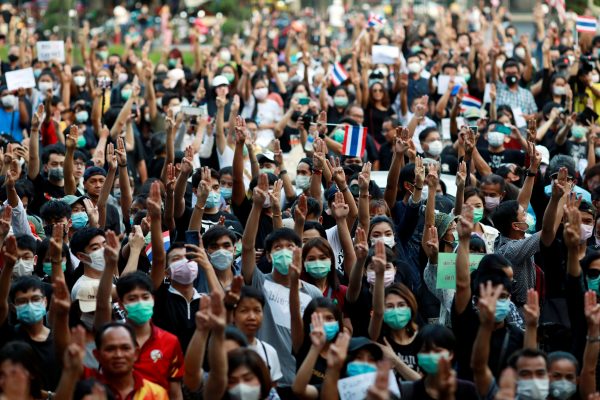Few were surprised. As Human Rights Watch observed, the Court refused to allow the party to fully present its case, with the verdict violating human rights and raising ‘serious fair trial concerns’. Even the usually conservative Bangkok Post saw the ruling as a dagger to the heart of Thailand’s latest effort at parliamentary politics.
The Court’s ruling appears complicated as it is couched in a cascade of references to the Constitution, the 2017 Political Party Act, and more. In reality the Court decided that a 191.2 million baht (US$6 million) loan from Future Forward leader Thanathorn Juangroongruangkit to the party was not a loan but a ‘donation’. In any case, even without this particular legal contortion, the military junta would have targeted Future Forward for destruction sooner or later.
There are several reasons why the military junta wanted to strangle the upstart party. First, Future Forward startled the junta when it garnered more than 6 million votes and 81 parliamentary seats in the March 2019 election, making it the third-largest party in parliament. This and the election of some sharp-tongued MPs marked the party as a threat to the post-junta regime.
Second, the party had huge support from young and social-media savvy voters. Conservatives fear that this group was becoming detached from the military and the monarchy.
Third, the party self-identified as being opposed to the military’s involvement in politics and military coups. Future Forward’s attacks on the military and the regime confirmed its ‘dangerous’ status to current Prime Minister General Prayut Chan-o-cha and his regime.
Finally, supporters of the regime believe that the party is anti-monarchy. In late 2019, Army commander General Apirat Kongsompong labelled the party and its leadership ‘communists’.
The regime’s fear of Future Forward resulted in scores of legal cases against the party to drain its resources and its supporters. But it was a complaint from the junta-established and politically-biased Election Commission to the Constitutional Court that ultimately brought the party down.
The Court’s dissolution of Future Forward has left many disappointed, disillusioned and angry but unsurprised by the verdict.
Since the 2006 coup, the Court has been a faithful servant of rightist parties and regimes. Its first major political intervention came in 2007 when former prime minister Thaksin Shinawatra’s Thai Rak Thai Party was dissolved and its executives banned. The Constitutional Tribunal responsible for this was composed of judges hand-picked by the junta. Startling legal observers, the Tribunal applied a new junta law retrospectively.
In 2008, the Court banned then prime minister Samak Sundaravej, who led a pro-Thaksin government elected in 2007, from office. Samak was accused of corruption for receiving small sums for travel costs and condiment expenses for a television cooking show that he had hosted. The Court considered this to be receiving a benefit from a company.
Then the Court ousted the coalition government in December 2008. The Court refused to hear witnesses, dissolved all parties in the government coalition and banned 109 of their executives. This resulted in a pro-military regime, led by the Democrat Party with Abhisit Vejjajiva as prime minister.
Former prime minister Yingluck Shinawatra’s Pheu Thai Party government was also destabilised by a Court decision. Yingluck’s government had won a landslide election victory in 2011, but in 2014, the Court removed her as prime minister, along with several other ministers. The court found her guilty of abuse of power over the ‘improper’ transfer of the national security chief in 2011. Such transfers had long been normal practice, yet the Court ruled that this particular transfer benefited Yingluck’s party. The 2014 coup soon followed, installing a military government.
In the run-up to the 2019 election, the Court was called on when the pro-Thaksin Thai Raksa Chart Party nominated King Vajiralongkorn’s elder sister Ubol Ratana as a prime ministerial candidate. Ubol Ratana had lost her royal status when she married an American in 1972, but following a divorce had returned to Thailand and behaved like a royal princess. King Vajiralongkorn immediately issued a royal announcement declaring that Ubol Ratana remained a member of the royal family and ordered that she was not permitted to take any political positions.
While there was no obvious legal basis to do this, the Election Commission immediately disqualified Ubol Ratana. Less than a month later, the Court ruled that Thai Raksa Chart had acted hostile towards the monarchy, dissolved the party and banned its executives for 10 years. These actions swayed the election in favour of Prayut.
Such landmark decisions mean that the Court has had a role in bringing down each elected government between 2006 and 2014.The Court has consistently supported rightist regimes, damaged elected governments and neutralised the votes of millions of Thai citizens. With a military-backed government in place following the 2019 election, the Court has made decisions that support it, including the dissolution of Future Forward.
In Thailand, political crises tend to explode from a long fuse. While Thanathorn has promised a rally in March, some Future Forward supporters have initiatiated ‘flash mobs’ involving hundreds of students. It remains to be seen whether these supporters will develop into a determined movement against the regime or simply be saddened by another demonstration of the judiciary’s double standards.
Kevin Hewison is the Weldon E Thornton Distinguished Emeritus Professor of Asian Studies at the University of North Carolina at Chapel Hill and Adjunct Professor at the University of Macau.

